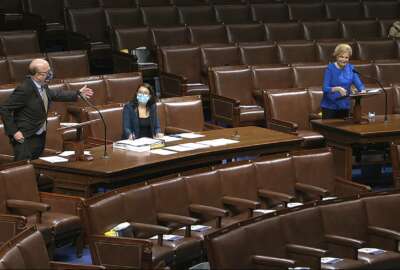
Update: House approves temporary measure for proxy voting, remote committee work
The temporary rules change would allow voting by proxy, which would enable some members to designate a colleague to vote for them if they can’t return to Capitol...
Best listening experience is on Chrome, Firefox or Safari. Subscribe to Federal Drive’s daily audio interviews on Apple Podcasts or PodcastOne.
The House, about two months into the coronavirus pandemic, approved a temporary rules change Friday that would give members a chance to vote and participate in committee hearings remotely.
The resolution aims to reduce the number of days members of the House need to be physically present, and opens the door for committees holding virtual markups for must-pass legislation in the coming weeks and months.
The temporary rules change would allow voting by proxy, which would enable some members to designate a colleague to vote for them if they can’t return to Capitol Hill safely to cast their vote in person.
“This House must continue legislating,” House Rules Committee Chairman Jim McGovern (D-Mass.) said on the House floor. “And we have to do so in a way that is safe for all those around us.”
However, committee ranking member Tom Cole (D-Okla.) warned the changes will fundamentally alter the nature of the institution, “and not for the better.”
Members can’t serve as a designated proxy for more than 10 members.
The resolution would also require the House Administration Committee to study the feasibility of remote voting on the House floor through videoconference platforms or other means.
House plays catch-up with Senate, Supreme Court on remote work
McGovern, during Thursday’s committee hearing on the issue, said the resolution would ensure continuity of operations and would allow the House to consider better options moving forward.
“I am not looking to change the fabric of this institution. I believe the best ideas still come from working in person and side by side, but we must adapt to this extraordinary circumstance and make temporary changes during this pandemic,” he said. “They will help us get our work done today and prepare us for whatever might happen tomorrow.”
Read more: Congressional News
Cole said remote voting would open the floodgates on lawsuits challenging the legality of critical legislation passed by these means.
“The legislation that we will likely pass by these methods in the near term will probably be bills along the lines of the CARES Act, bipartisan measures that deal with the coronavirus pandemic and the resulting economic distress,” Cole said. “It does not make sense to me to put such important legislation at risk of a court challenge, because we failed to comply with the constitutional requirements.”
House Administrative Committee Ranking Member Rodney Davis (R-Ill.), also a member of the House Modernization Committee, raised technical concerns about remote voting.
The House, he noted, saw a surge in unauthorized scans, probes and malicious attempted network connections in the month after House allowed members to introduce bills via email.
The number of intrusions attempts, he added, would only increase if Congress moved to more remote capabilities
Passing the resolution, Davis said, would create a “new precedent that will forever change the house processes, threatened legitimacy of members votes and opened a Pandora’s box of unnecessary constitutional risks.”
Moving to remote voting and committee hearing and markups, he added, would largely depend on the capacity of the House Clerk and the Chief Administrative Officer to support this added workload.
Read more: Cybersecurity News
“I have confidence in the clerk, CAO and the professionals on their teams. However, it is unfair to them and puts the institution at risk by not first listening to them, mitigating risks and testing the process extensively. These steps have been skipped,” Davis said.
However, the status quo carries its own liabilities as well. The rules committee, the smallest in the House, held its hearing in the House Appropriations Committee room, in order to adhere to social distancing recommendations from the Capitol physician.
McGovern said bringing back more members to pass must-passed legislation, such as fiscal 2021 spending bills and the National Defense Authorization Act, would make it untenable to keep the work of the Congress going safely.
“If we’re going to follow CDC guidelines, that is problematic,” he said.
House Majority Leader Steny Hoyer (D-Md.) said remote voting would only be used during emergencies, and wouldn’t set a long-term precedent for lawmakers.
Meanwhile, House and Senate committees have held virtual or “hybrid” hearings, in which some members sit in-person in the committee room, and others participate virtually.
The Supreme Court, has also ventured into new territory by holding oral arguments remotely to ensure continuity of operations.
“It is also unsafe to require thousands of House staff and Capitol Hill employees to commute to work while infections have not even reached their peak in the Washington metro area. That’s why we must adopt the kind of virtual practices authorized by this resolution,” Hoyer said.
However, House Minority Leader Kevin McCarthy (R-Calf.) led committee ranking members in expressing concern over the rules change, arguing that it would give the committee chairman “unilateral authority” over how the House conducts its business.
“Upending more than 200 years of precedent through partisan fiat will jeopardize the deliberative process of the House of Representatives and our ability to represent our constituents. The House will be in session this week with debate being held and votes being cast. If the whole House can conduct business while adhering to health guidelines, then so too can our committees,” the Republican leaders wrote in a letter to Hoyer.
The Associated Press contributed to this story.
Copyright © 2025 Federal News Network. All rights reserved. This website is not intended for users located within the European Economic Area.
Jory Heckman is a reporter at Federal News Network covering U.S. Postal Service, IRS, big data and technology issues.
Follow @jheckmanWFED





